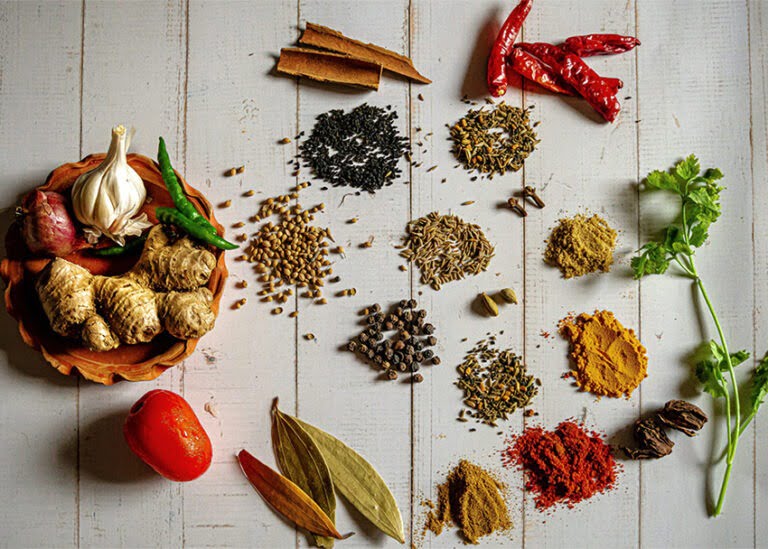Do you know that spices can be an easy way to incorporate more gut loving ingredients to your meals?
When you think of spices, the first thing that comes to mind is probably their ability to make food taste better. This is certainly true—spices can transform bland dishes into culinary masterpieces. But as it turns out, there’s a lot more to spices than meets the eye (or tongue). For instance, they have been used for thousands of years not only as flavor enhancers but also as a powerful therapy. In this blog post we’ll explore just how spicing up your diet can help with digestion and gut health!
Cinnamon
Cinnamon is a powerful antioxidant that helps fight free radicals, which can damage cells and cause disease. Cinnamon also has anti-inflammatory properties, making it useful for reducing symptoms of arthritis and other inflammatory conditions.
Cinnamon has been shown to help lower blood sugar levels in people with type 2 diabetes by enhancing insulin sensitivity, which is great news for anyone who wants to use food to improve their symptoms. Studies have found that cinnamon can reduce cholesterol levels too–not just LDL “bad” cholesterol but also triglycerides (another fat) and HDL (“good”) cholesterol. It may even protect against heart disease by inhibiting platelet aggregation (the process through which blood clots form).
Cinnamon’s effects on brain health are well documented: The spice has been shown to improve memory recall as well as cognitive function over time by increasing blood flow throughout the brain. Plus, there is some research to suggest that consuming about 1/4 teaspoon daily could help improve your insulin sensitivty (leading to better blood sugar control) than if you didn’t add this spice into your diet at all!
My favorite way to incorporate more cinnamon: add a dash to your morning coffee or to your chia pudding or yogurt parfait.
Ginger
Ginger is a root with a spicy, pungent flavor that’s used in many cuisines. It can be eaten raw or dried, grated or sliced into salads or stir-fries. In addition to its culinary uses, ginger has been shown to help with digestion and reduce inflammation–both of which are good for your gut health!
Ginger is one of our “go-to’s” for gut health when it comes to improving gut motility and aiding with more complete bowel movements.
My favorite way to incorporate more ginger: a cup of ginger tea to aid digestion
Turmeric
Turmeric is a spice that has been used for thousands of years in India, where it’s known as “the golden spice.” It’s also one of the most powerful antioxidants and anti-inflammatory agents around.
Turmeric contains curcumin, which some studies have shown can reduce symptoms of rheumatoid arthritis, inflammation associated with irritable bowel syndrome (IBS) and Crohn’s disease and even help prevent Alzheimer’s disease. Turmeric can be used fresh or dried as well as ground into powder form–and it tastes great! You may already be familiar with turmeric’s bright yellow color; it lends itself nicely to curries and other dishes with Indian flavors such as chai tea or eggplant parmesan sauce.
My favorite way to incorporate more turmeric: add ⅛ of a teaspoon of turmeric powder and ⅛ of a teaspoon of black pepper to rice for anti-inflammatory benefits.
Cardamom
Cardamom is a spice that has been used for centuries as a digestive aid and to boost immunity. It contains antioxidants, which help to protect the body from free radical damage that can lead to cancer and other diseases.
Cardamom has also been shown in studies to lower cholesterol levels, reduce inflammation and lower blood sugar levels when taken regularly over time. This makes it beneficial for people with diabetes or those who are trying to improve insulin sensitivity controlling their blood sugar levels naturally instead of using medication such as statins which have many side effects including muscle pain/weakness (myopathy), liver damage or kidney failure if taken over long periods of time (https://www.mayoclinichealthcareersblog/2019/02/26/how-to-get-started-in-medicine).
In addition cardamom helps reduce flatulence which means you’ll feel less bloated after eating spicy food!
My favorite way to incorporate more cardamom: add it to stew
Cloves
Cloves are a popular spice used in Indian cooking. They’re also used in many cuisines around the world, including Thai and Chinese food. Cloves are a great source of antioxidants that can help you fight free radicals (unstable molecules that can damage cells), which may reduce your risk of cancer. Cloves have anti-inflammatory properties that make them useful for treating toothaches by numbing the pain while healing damaged tissue caused by decay or infection.
Oral health is often a missing component of gut health. When the oral microbiome is unhealthy, the rest of the gut will be unhealthy. When clients work with the gutTogether® team, we often find that diminished oral health is a contributing factor to their chronic digestive symptoms.
My favorite way to incorporate more: add it to a hearty soup recipe
Garlic
Garlic is a member of the allium family, along with onions and leeks. It’s known for its medicinal properties, including antibacterial and antifungal effects. Garlic has been used for thousands of years as a natural remedy for various ailments including colds and flu.
Garlic contains antioxidant compounds called organosulfur compounds that have been shown to reduce inflammation in the gut lining–a protective layer that helps keep out pathogens like bad bacteria or parasites from entering your body through food or water that’s contaminated with them (like when you’re traveling).
In addition to its anti-inflammatory properties, garlic also contains allicin–a sulfur compound found in raw garlic but not cooked versions because cooking removes most of its health benefits by breaking down some compounds into simpler forms that are less effective at fighting infections in our bodies (1).
My favorite way to incorporate more: adding fresh garlic into homemade salad dressings or my famous tahini sauce in my book, The Healthy, Happy Gut Cookbook
Cayenne pepper
Cayenne pepper is a great spice for digestion. It can help with bloating, gas and constipation. It’s also beneficial for inconsistent stool patterns, because it stimulates the gallbladder to produce bile which softens stools and makes them easier to pass through your digestive tract.
My favorite way to incorporate more cayenne pepper: sprinkle a bit into any dips such as hummus, guac, pico de gallo
Cilantro/Coriander (cilantro)
Cilantro/coriander is the seed of the cilantro plant and it’s often used in Mexican and Indian cuisine.
Coriander is a good source of vitamin C, iron and magnesium. It can help with digestion because it contains fiber that helps food move through your intestines faster so that you feel full quicker after eating. It may also help lower blood sugar levels by slowing down how quickly your body absorbs sugar from carbohydrates or starches (1).
Cilantro has anti-inflammatory properties which means if you suffer from inflammatory conditions like IBS, celiac disease or Crohn’s disease then adding more cilantro into your diet may help ease some of those symptoms (2).
My favorite way to incorporate more: use as a garnish for a taco bowl
Basil
Basil is a great digestive aid. It’s one of the best herbs for digestion, and it can help relieve symptoms of indigestion, bloating and gas. Basil also has anti-inflammatory properties that may help reduce inflammation in your body (like after working out).
Basil can also stimulate your metabolism and has been shown to improve blood sugar levels by lowering insulin resistance.
And lastly…basil has antioxidant properties that help protect against cancer cells in our bodies–which means basil might be able to prevent some types of cancer!
My favorite way to incorporate more basil: making homemade pesto!
Oregano
Oregano is an herb that can be used in many different types of cooking. It’s most often associated with Italian and Mediterranean dishes, but you can find it in many other cuisines as well. Oregano has been used for centuries as a spice and medicine. It’s considered to be one of the most nutrient dense spices available because it contains high levels of antioxidants, making it an excellent source for preventing diseases like cancer or heart disease.
Oregano contains several different antioxidants including carvacrol (which has antibacterial properties), thymol (known for its ability to fight infections) and rosmarinic acid–a powerful antioxidant that helps prevent cell damage caused by free radicals. These nutrients help reduce inflammation while also helping with digestion, heart health and cancer prevention.
My favorite way to incorporate more oregano: use it as seasoning for chicken or potatoes
Mint
Mint is a great digestive aid. If you’re suffering from nausea, vomiting or indigestion, mint can help with that. Mint also helps with heartburn and flatulence. This herb can even be used for gas!
Many of our gutTogether® clients find that peppermint tea helps to relieve trapped gas after a meal.
My favorite way to incorporate more mint: add it to a crema for a sheet pan meal or bowl
Black pepper
Black pepper is good for digestion and stimulates the digestive system. It also helps with indigestion, bloating, gas and constipation.
Black pepper contains piperine which has been shown to increase bile production in rats (and humans) by up to 40%. This means that it can help with gallstones or gallbladder blockage which is key for optimal gallbladder function. Black pepper may also improve insulin sensitivity by increasing glucose uptake into cells while reducing blood sugar levels after eating carbohydrate-rich foods like pasta or breads–which makes sense given its traditional use in curries where there’s plenty of starch!
My favorite way to incorporate more black pepper: adding it to a golden milk latte in addition to turmeric!
Let’s spice up our gut healing.
Spices are a great way to add flavor to food, but they’re also full of nutrients and beneficial properties for your gut health. There are many different types of spices, but they all have similar benefits when it comes to our digestive system.
Spices are a great way to kickstart your digestion, especially if you’re feeling sluggish or experiencing indigestion. They help reduce inflammation in the body, which may be causing bloating and gas issues for some people. Spices are beneficial for those who have trouble digesting certain foods because they contain compounds that act as enzymes, breaking down food particles so that they’re easier for our bodies to break down and absorb nutrients from them
So let’s spice up our gut healing!
Are you ready to heal your gut & love food again? Gain access here to my private podcast ‘Heal your Gut & Love Food Again’ by clicking here!
- Khan, A., Safdar, M., Ali Khan, M. M., Khattak, K. N., & Anderson, R. A. (2003). Cinnamon improves glucose and lipids of people with type 2 diabetes. Diabetes care, 26(12), 3215-3218. doi: 10.2337/diacare.26.12.3215
- Lu, T., Sheng, H., Wu, J., Cheng, Y., & Zhu, J. (2005). Cinnamon extract prevents the insulin resistance induced by a high-fructose diet. Hormone and metabolic research, 37(09), 590-595. doi: 10.1055/s-2005-870337









